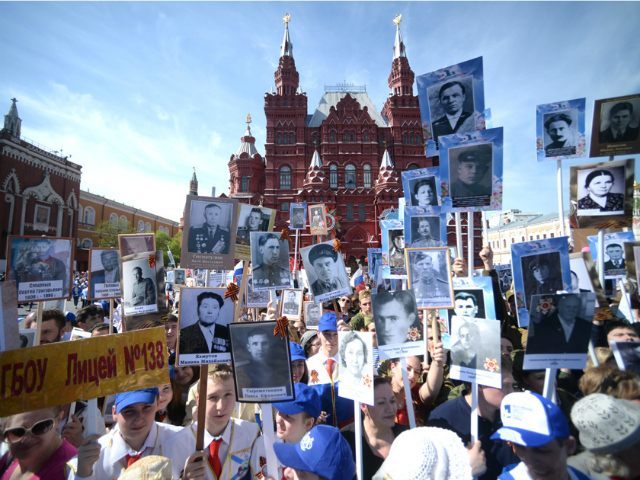There was a significant absence in Moscow on May 9. Even though it was the 70th anniversary of the official end of the European front of World War II, the leaders of the victorious allied powers decided not to attend the Victory Day parade due to increasing tensions with Russia over Ukraine.
Russia always displays its military might on Victory Day, the day the Allies accepted the unconditional surrender of the Nazis. Russia takes great pride in the celebrations, since it was the USSR that barreled into Berlin and raised the sickle and hammer over the Reichstag on May 2, 1945.
The 70th anniversary was no different. Over 16,000 troops and 250,000 others marched down Red Square along with monstrous army vehicles and weapons, including the newest Armata T-14 tank. Chinese President Xi Jingping, the highest ranking foreign official at the celebration, sat next to Russian President Vladimir Putin. Other leaders who attended included Egyptian President Abdel Fattah al-Sisi, Cuban leader Raul Castro, Venezuelan leader Nicolas Maduro, and Zimbabwe dictator Robert Mugabe. North Korean dictator Kim Jong-un was scheduled to attend but cancelled at the last minute. Ambassador John Tefft represented America while the UK sent Winston Churchill’s grandson.
A year after Russian forces first invaded Ukraine, the West continues to put distance between itself and Putin. The governments passed numerous sanctions against Russian officials and oligarchs in the past year. Putin’s inbox filled with declines from Western leaders to join him at the parade.
“With a view to Russia’s actions in Crimea and eastern Ukraine, taking part in a military parade appears not appropriate,” explained German Chancellor Angela Merkel’s spokesman, Steffen Seibert, when she turned down Putin’s invitation.
Merkel attended a small-scale celebration on May 10. She placed a wreath at the grave of the Unknown Soldier. But she also used the trip to lash out at Putin over Ukraine and history.
“We have sought more and more cooperation in recent years,” she exclaimed at a press conference after the two spoke privately for two hours. “The criminal and illegal annexation of Crimea and the warfare in eastern Ukraine has led to a serious setback for this cooperation.”
Putin shot back by reminding Merkel that “German companies had profited immensely over the years in the Russian market.” Germany is one of the largest importers of Russian energy. They receive 38 percent of their natural gas, 35 percent of oil, and 25 percent of coal from Russia.
Russian involvement was immensely crucial in the Allied victory over Germany. The Western front stretched the Allies thin, especially since America needed forces in the Pacific. The Russians provided the much-needed strength in the East. Russia continues to emphasize its role as a liberator, especially when it comes to Poland. However, Josef Stalin invaded Poland on September 17, 1939, and split up the country based on the terms of the Molotov-Ribbentrop Pact. While they changed sides and liberated the Nazi concentration camps, Merkel reminded Putin what Stalin did after the war.
“I would like also to recall that the end of World War II did not bring democracy and freedom for all in Europe,” Merkel told Putin.
It should be noted the 1st Ukrainian Front liberated Auschwitz, but these soldiers fought with the Red Army.
President Franklin Roosevelt and United Kingdom Prime Minister Winston Churchill allowed Stalin to retain the land he illegally gained under the Molotov-Ribbentrop Pact. He promised to allow Poland to choose its own fate, but it did not take long for both leaders to realize he fooled them in the same way Hitler fooled Neville Chamberlain, Churchill’s predecessor.
With support from the Russian communist party, the communists in Poland produced a puppet government. Poland was not an official member of the USSR, but a satellite state. The Allies also split Germany, with the USSR implementing Communism behind the iron curtain. Merkel lived behind that curtain during the first half of her life.
Despite the absences of the Allies, Putin did thank them in his speech.
“Our fathers and grandfathers went through unbearable suffering, deprivation and losses,” he said. “We are grateful to the people of Great Britain, France and the United States for their contribution to victory.”
But Putin could not resist and blasted the West for their sanctions.
“We have seen attempts to create a unipolar world, we see gaining momentum as a force of bloc thinking,” he claimed. “Our common goal should be the development of a system of equal security for all states. Systems, adequate to modern threats, built on regional and global, non-bloc basis. Only then can we ensure peace and tranquillity [sic] in the world.”

COMMENTS
Please let us know if you're having issues with commenting.